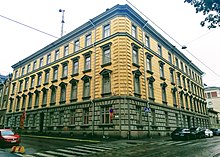Security agency
Asecurity agencyis agovernmental organizationthat conductsintelligenceactivities for theinternal securityof anation.[1]They are the domestic cousins of foreignintelligence agencies,and typically conductcounterintelligenceto thwart other countries' foreign intelligence efforts.[2][3]
For example, the United StatesFederal Bureau of Investigation(FBI) is an internal intelligence, security andlaw enforcementagency, while theCentral Intelligence Agency(CIA) is an external intelligence service, which deals primarily with intelligence collection overseas. A similar relationship exists inBritainbetweenMI5andMI6.
The distinction, or overlap, between security agencies,national police,andgendarmerieorganizations varies by country. For example, in theUnited States,one organization, the FBI, is a national police, an internal security agency, and a counterintelligence agency. In other countries, separate agencies exist, although the nature of their work causes them to interact. For example, in France, thePolice nationaleand theGendarmerie nationaleboth handle policing duties, and theDirection centrale du renseignement intérieurhandles counterintelligence.
Likewise, the distinction, or overlap, betweenmilitaryandciviliansecurity agencies varies between countries. In the United States, the FBI and CIA are civilian agencies, although they have variousparamilitarytraits and have professional relationships with the U.S.'smilitary intelligenceorganizations. In many countries all intelligence efforts answer to the military, whether by official design or at least on ade factobasis. Countries where various military and civilian agencies divide responsibilities tend to reorganize their efforts over the decades to force the various agencies to cooperate more effectively, integrating (or at least coordinating) their efforts with some unified directorate. For example, after many years of turf wars, the member agencies of theUnited States Intelligence Communityare now coordinated by theDirector of National Intelligence,with the hope to reducestovepipingof information.
InIreland,for example, intelligence operations relevant to internal security are conducted by the military (G2) and police (SDU), rather than civilian agencies.
Security agencies frequently have "security","intelligence "or" service "in their names. Private organizations that provide services similar to a security agency might be called a" security company "or" security service ", but those terms can also be used for organizations that have nothing to do with intelligence gathering.
Security agency vs. secret police
[edit]There is debate about whether some security agencies should be characterized assecret policeforces. The extent to which security agencies use domestic covert operations to exert political control varies by country and political system. Such operations can include surveillance, infiltration, and disruption of dissident groups, attempts to publicly discredit dissident figures, and even assassination or extrajudicial detention and execution. Security agencies are constrained in some countries by a mesh of judicial and legislative accountability, whereas in others they may answer only to a single leader or executive committee.
Security agencies
[edit]

- Afghanistan:General Directorate of Intelligence
- Armenia:National Security Service
- Australia:
- Bahrain:National Security Agency
- Bangladesh:National Security Intelligence(NSI)
- Belarus:State Security Agency of the Republic of Belarus(KDB or KGB)
- Bosnia and Herzegovina:Intelligence-Security Agency of Bosnia and Herzegovina
- BrazilFederal Police
- Brunei:Internal Security Department (Brunei)
- Canada:Canadian Security Intelligence Service,successor ofRCMP Security Service
- China:Ministry of State Security (China)
- Croatia:Military Security and Intelligence Agency(Croatian: Vojna sigurnosno-obavještajna agencija or VSOA or VSA) andSecurity and Intelligence Agency(Croatian: Sigurnosno-obavještajna agencija ili SOA)
- East Germany (former):Stasi
- Estonia:Estonian Internal Security Service(KAPO)
- Ethiopia:
- European Union:European Union Agency for Network and Information Security(ENISA, originally European Network and Information Security Agency)
- Finland:Finnish Security Intelligence Service(SUPO)
- France: functions divided betweenPolice nationale,Gendarmerie nationale,andDirection générale de la Sécurité intérieure
- Germany:Federal Office for the Protection of the Constitution (Germany),Bundeskriminalamt
- India:
- Ministry of Home Affairs
- Ministry of Finance
- Indonesia:Indonesian State Intelligence Agency
- Ireland:
- Directorate of Military Intelligence (Ireland)
- Special Detective Unit,formerly the Special Branch and before that the Criminal Investigation Department (CID)
- Israel:Shin Bet(Israel Security Agency (ISA)) and others: seeIsraeli Intelligence Community
- Japan:Public Security Intelligence Agency(PSIA)
- Malaysia:Royal Malaysian Police Special Branch
- Netherlands:General Intelligence and Security Service
- New Zealand:New Zealand Security Intelligence Service
- Nigeria:State Security Service(SSS)
- Norway:Norwegian Police Security Service
- Oman:Internal Security Service
- Pakistan:
- Poland:Agencja Bezpieczeństwa Wewnętrznego
- Portugal:
- Sistema de Informações da República Portuguesa(SIRP)
- former:PIDE,or Polícia Internacional e de Defesa do Estado
- Russia:
- Serbia:Military Security Agency(BIA) (Serbian: Безбедносно-информативна агенција, БИА / Bezbednosno-informativna agencija, BIA)
- Singapore:Internal Security Department (Singapore)
- Slovenia:Slovenian Intelligence and Security Agency
- Somalia:National Intelligence and Security Agency(NISA) (Somali: Hay'ada Sirdoonka iyo Nabadsugida)
- Soviet Union (former):
- Cheka
- State Political Directorate(GPU)
- People's Commissariat for Internal Affairs(NKVD) which becameMinistry for Internal Affairs(MVD)
- People's Commissariat for State Security(NKGB) which becameMinistry for State Security(MGB)
- SMERSH
- KGB,Komitet gosudarstvennoy bezopasnosti (Russian: Комите́т госуда́рственной безопа́сности (КГБ)
- South Africa:State Security Agency (South Africa)
- Spain (all the following agencies have security and security intelligence functions):
- Sri Lanka:State Intelligence Service (Sri Lanka)(SIS)
- Sweden:Swedish Security Service(Säkerhetspolisen, SÄPO)
- Switzerland:Intelligence Service of the Federation(Nachrichtendienst des Bundes)
- Turkey:The National Intelligence Organization(Millî İstihbarat Teşkilâtı, MIT)
- Ukraine:Security Service of Ukraine
- United Kingdom (all the following agencies have security and security intelligence functions):
- MI5(also known as the Security Service)
- MI6(also known as the Secret intelligence Service)
- Government Communications Headquarters(GCHQ)
- Defence IntelligenceStaff (DIS)
- National Crime Agency(NCA)
- United States (all the following agencies have security and security intelligence functions):
- Vietnam:Ministry of Public Security(Bộ Công an, BCA)
See also
[edit]References
[edit]- ^"security agency".Collins.
- ^Bamford, James (2007-12-18).Body of Secrets: Anatomy of the Ultra-Secret National Security Agency.Knopf Doubleday Publishing Group.ISBN978-0-307-42505-8.
- ^"Security agency Definition".Law Insider.Retrieved2022-05-24.
